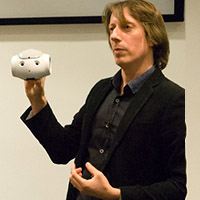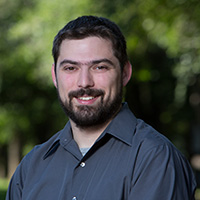
Cindy L. Bethel, Ph.D. (IEEE and ACM Senior Member) is an Associate Professor in the Computer Science and Engineering Department at Mississippi State University (MSU). She is the Director of the Social, Therapeutic, and Robotic Systems (STaRS) lab and a Research Fellow with the MSU Center for Advanced Vehicular Systems Human Performance Group. She is an affiliated faculty with the Department of Psychology. She is a member of the Academy of Distinguished Teachers in the Bagley College of Engineering at MSU. She also was awarded the 2014-2015 ASEE New Faculty Research Award for Teaching. She was a NSF/CRA/CCC Computing Innovation Postdoctoral Fellow in the Social Robotics Laboratory at Yale University. In 2008, she was a National Science Foundation Graduate Research Fellow and the recipient of the 2008 IEEE Robotics and Automation Society Graduate Fellowship. She graduated in August 2009 with her Ph.D. in Computer Science and Engineering from the University of South Florida. Her research interests include human-robot interaction, human-computer interaction, robotics, and artificial intelligence. Her research focuses on applications associated with robotic therapeutic support, information gathering from children, and the use of robots for law enforcement, search and rescue, and military.

Tony Belpaeme is Professor of Cognitive Systems and Robotics at Plymouth University. He is associated with the Cognition Institute and the Centre for Robotics and Neural Systems. His research interests include human-robot interaction, social systems, and artificial intelligence in general. Belpaeme’s lab tries to further the science and technology behind artificial intelligence of social robots, taking inspiration from human cognition to build useful machines. He is keen on outreach and the public understanding of robotics and artificial intelligence. Plymouth University is home to a team of in-house developed humanoid robot footballers, which compete in international competitions and are used to enthuse a young generation. Belpaeme's work in robotics has been exhibited at the Natural History Museum, the National Space Centre and the Science Museum. His work has featured the international press, including Scientific American. In 2013 and 2014 his research was recognised as one of “ten life-changing ideas under research at UK universities†by Research Councils UK.

David Feil-Seifer is an Assistant Professor in Computer Science at the University of Nevada, Reno. His primary research interests are Socially Assistive Robotics (SAR) and User Interface design for Unmanned Autonomous Systems (UAS-UI). His research is motivated by the potential for SAR to address health-care crises that stem from a lack of qualified care professionals for an ever-growing population in need of personalized care as well as the uses for aerial robots for disaster mitigation.
Prior to his tenure at UNR, he was a Postdoctoral Associate at Yale University at the Social Robotics Lab under the direction of Prof. Brian Scassellati. He was awarded a National Science Foundation/Computing Research Association Computing Innovation Fellowship to support his postdoctoral work. He received a B.S. in Computer Science from the University of Rochester and a M.S. and Ph.D. in Computer Science from the Viterbi School of Engineering (VSoE) at the University of Southern California (USC) under the direction of Prof. Maja Matarić. He helped coin the term, Socially Assistive Robotics (SAR), and studied its applications for children with autism spectrum disorders (ASD). He has been awarded the Mellon award for Mentoring, the Order of Arete, and the USC VSoE Best Dissertation award.​

Hae Won Park is a postdoctoral associate at the Personal Robots Group (PRG) at the MIT Media Lab. Her research focuses on deep personalization of long-term human-robot interaction. She was a former member of the Human-Automation Systems Lab at Georgia Tech where she co-founded Zyrobotics, an accessible education startup that is licensing the three patents from her PhD research. Zyrobotics was awarded the best 2015 US robotics startup by Robohub and was the 2015 Intel Innovation Award Finalist in which she delivered an elevation pitch. Her work was featured in news articles including IEEE, Small Business Revolution, Engadget, and CNET.

Dr. Ross Mead is the Founder and CEO of Semio, a startup developing a standardized software framework and tools for natural communication interfaces (speech and body language) between human users and smart devices, including personal robots. Ross received his PhD and MS in Computer Science at the University of Southern California in 2015, and his BS in Computer Science from Southern Illinois University Edwardsville in 2007. Ross’ overarching research interest is concerned with the modeling of nonverbal social behaviors—such as interagent spacing, visual attention, and gestures—for the purposes of autonomous recognition and control in face-to-face human-robot interaction.